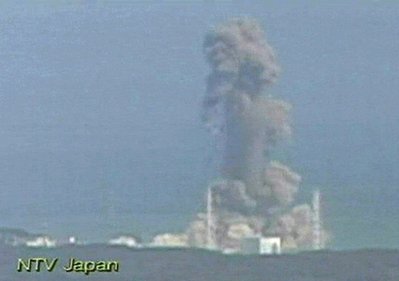 |
|
In this image made off Japan's NTV/NNN Japan television footage, smoke ascends from the Fukushima Dai-ichi nuclear plant's Unit 3 in Okumamachi, Fukushima Prefecture, northern Japan, Monday, March 14, 2011.(Agencies) |
|
Governments around the world ordered urgent safety reviews of their nuclear power facilities last night as the crisis in Japan continued to escalate. The EU will host an emergency meeting of energy ministers and nuclear safety officials today to discuss the situation at the 150 nuclear power stations within its territories. A spokesman said the aim of the hastily organised meeting was to get first-hand information about what contingency plans were in place should an emergency occur. The Swiss government announced it was suspending plans to replace its ageing nuclear power stations until security and safety measures could be assessed. Manmohan Singh, the Indian prime minister, ordered safety checks on all nuclear power plants to ensure they could withstand an earthquake or tsunami. In Germany, Chancellor Angela Merkel announced a three-month moratorium on government plans to postpone by more than a decade the decommissioning of Germany’s 17 nuclear reactors. This could lead to the immediate switch-off of the country’s two oldest plants, Mrs Merkel added. “If a country like Japan with its high safety norms and safety standards can apparently not prevent the nuclear consequences of an earthquake and a tsunami, then the whole world … can’t just go back to business as usual,” she said. In Britain, Chris Huhne, the Environment Secretary, insisted that the Government would examine closely any lessons to be learnt from the Japanese experience. The Government is planning a new generation of nuclear power stations which are due to begin generating power by 2020. Last night, critics said the plans should be put on hold until a major safety assessment had been conducted. Andy Atkins, the executive director of Friends of the Earth, said: “We can’t keep heading down the nuclear route until the lessons from this crisis have been learnt.” While most countries, including Britain, are not at substantial risk from earthquakes, experts have pointed out that it was the power failure following the Japanese tsunami that led to the crisis at the Fukushima plant. Dr Paul Dorfman, a nuclear policy research fellow with the Rowntree Charitable Trust, said building nuclear facilities on the coast meant they could never be completely safe from flooding and other natural phenomena. He explained: “The current proposals will see a proliferation of very large nuclear facilities built at a number of coastal locations vulnerable to rising sea levels, flooding and storm surge. This is clearly of major concern.” (Read by Renee Haines. Renee Haines is a journalist at the China Daily Website.)
(Agencies)
|
由于日本核危机持续升级,全球多国政府昨晚要求立即对本国的核电设施进行安全检查。 欧盟将在今天举行能源部长以及核安全官员紧急会晤,商讨欧盟成员国境内共150座核电站的安全状况。一位发言人表示,此次紧急会议的目的是获取紧急情况发生时应急预案的第一手资料。 瑞士政府宣布,在重新评估安保措施之前,暂停老化核电站的更新改造计划。 印度总理曼莫汉•辛格要求对境内所有核电厂进行安全检查,确保可抵御地震或海啸。 德国总理安吉拉•默克尔宣布,政府将把延长17座核电站营运期长达十多年的决定押后三个月。 默克尔补充称,德国最老旧的两座核电站将立即关闭。 她说:“日本核电安全规范和标准很高,很明显这样的国家都无法防止地震和海啸带来的核危害,那么全球的核电站就都需要检查了。” 英国气候变化大臣克里斯•胡尼坚称,政府将从日本核危机中吸取教训,密切监视本国核电安全。英国计划开发新一代核电站,这批核电站将从2020年开始发电。昨晚,批评人士指出,该计划应于主要的安全评估完成后开始实施。 “地球之友”环保组织的主管安迪•阿特金斯说:“我们首先要吸取此次核危机的教训,才能进一步开展核计划。” 虽然英国等国家并不会受到此次地震的严重危害,但专家指出,日本海啸之后的断电导致了福岛核电站危机。朗特里慈善基金会的核政策研究员保罗•多尔夫曼博士称,只要在沿海建核电站,就无法完全避免洪水和自然现象引发的事故。 他解释道:“按照目前的规划,在沿海建造的大型核电站会越来越多,这些核电站容易受到海平面上升、洪水和风暴潮的袭击。我们最担心这一点。” 相关阅读 (中国日报网英语点津 Julie 编辑:冯明惠)
|
|
Vocabulary: first-hand information: 第一手资料 moratorium: an authorized period of delay or waiting(暂停,中止,尤指经官方同意的) decommissioning: to deactivate; shut down(关闭,解除运作) |
